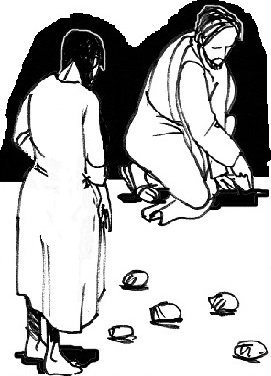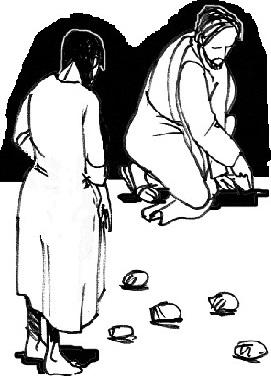

“So what do you say?” (John 8:4).
Dan 13:1-62; John 8:1-11
The Lectionary’s pairing of today’s readings suggests that the story of Susanna in the book of Daniel is the probable basis for the story in the fourth Gospel of the woman taken in adultery. There are some similarities and significant differences in the two stories, and these reveal the evangelist’s intent in depicting Jesus as the one who rescues the woman from death by stoning.
First the similarities. Both scenes in which women are accused are set-ups. The elders lusted after Susanna and trapped her into choosing between sex with them or public shaming and death. The trial scene is dramatically and vividly eroticized. Only the appearance of a hero saves her.
The scribes and Pharisees claim the role of righteous judges but manage to be eyewitnesses to an adultery. They let the male partner escape but drag the woman before Jesus, who is teaching in the temple. In that public setting, their lurid accusations turn the crowd into a mob with stones ready to rain them down on the woman’s exposed flesh. Only men were allowed to carry this out, and the chance to do violence to an accused woman is as erotically charged as any lynching scene in the brutal history of American racism.
The heightened evil of this attempt to trap Jesus between the Law of Moses and his message of mercy is that the scribes and Pharisees deliberately use the woman as bait, disregarding her fate as inconsequential to their real plot to kill Jesus.
The boy Daniel saves Susanna by cleverly unmasking the hypocrisy of the elders, leading to their executions. Jesus remains silent and forces the accusers to judge themselves and retreat in shame, while the woman is not judged at all and set free to “sin no more.” Jesus overlooks the deeper sinfulness of the scribes and Pharisees and sends them away to repent of both their lust and their murderous plotting.
Mercy triumphs with neither judgment nor violence to anyone, except Jesus himself. He continues his journey to the cross, the only truly innocent and holy figure in the story. Silent before his accusers, Jesus is fulfilling the role assigned to him in his desert sojourn by the Spirit, to be the Suffering Servant and the Lamb of God, sacrificed for the sins of the world.
Let stony hearts fall to the ground as we prepare ourselves for Holy Week. Once again, we will engage our annual sacred drama, witnessing Jesus’ triumphal entry into Jerusalem on Palm Sunday, then his Passion on Good Friday. The weight of his cross will include our own sins, acknowledged or not, atoned or ignored. He will die for everyone, saints and sinners, to reveal the power of divine mercy, which alone can open history to a different destiny, transforming an old, tired creation into a New Creation, where love will make it easy to be good.
Advertisement







